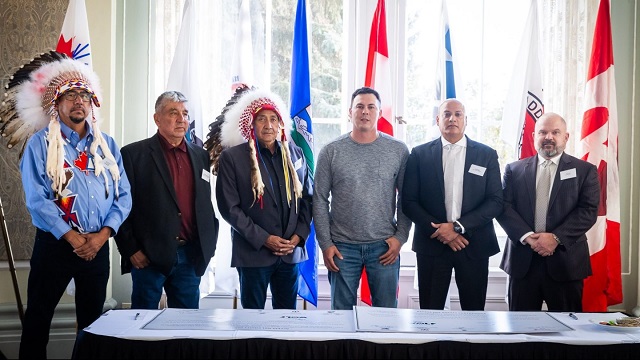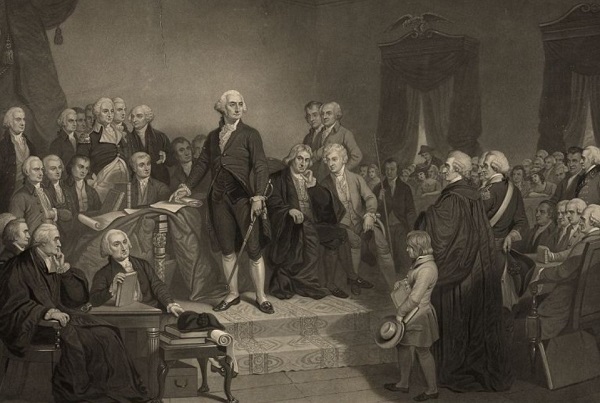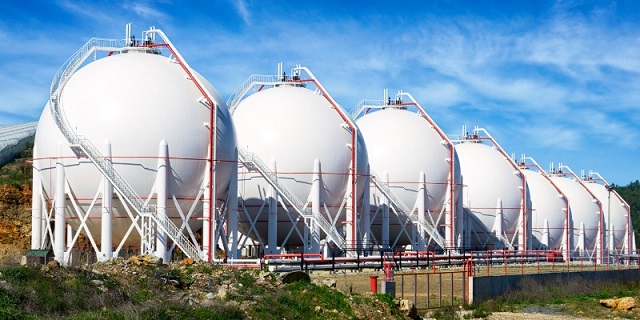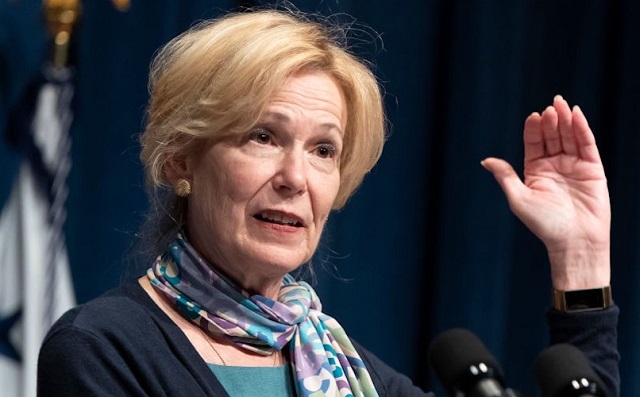Alberta
Indigenous leaders see progress in 2023 but continue to advocate for national loan guarantee program

Wolf Midstream and its partners in the Northern Lakeland Indigenous Alliance participate in a signing ceremony celebrating a $103 million loan guarantee from the AIOC to obtain a 43% stake in the Access NGL Pipeline System. Photo courtesy AIOC
From the Canadian Energy Centre
By Shawn Logan
“Things are starting to work but self-determination is the ultimate goal.”
When John Desjarlais reflects on 2023, he admits he had feared a growing national tide of Indigenous investment in key energy projects was due to hit a speedbump.
Instead, as a new year approaches, the executive director of the Indigenous Resource Network (IRN) says any doubts have been replaced by optimism that the positive momentum of the last few years will flow into 2024.
“I’m feeling more optimistic now. I’m pleased to see the level of conversation being had with Indigenous leaders,” he said.
“I think there is growing opportunity for Indigenous participation across entire value chains, for board and executive positions, and more meaningful involvement. I think we’re really going to see the needle move in 2024.”
 John Desjarlais, executive director of the Indigenous Resource Network in Bragg Creek, Alta. Photo by Dave Chidley for the Canadian Energy Centre
John Desjarlais, executive director of the Indigenous Resource Network in Bragg Creek, Alta. Photo by Dave Chidley for the Canadian Energy Centre
Despite the year’s slow start, Desjarlais said 2023 became something of a bellwether for how the rest of the world views the involvement of First Nations and Métis in Canada’s oil and gas industry.
In April, Desjarlais joined a delegation of Indigenous leaders in Ottawa to meet face-to-face with diplomats from some of the world’s strongest economies. Joined by Haisla Nation Chief Councillor Crystal Smith, First Nations LNG Alliance CEO Karen Ogen and former Enoch Cree First Nation chief Billy Morin, the delegation quickly learned not only was there an appetite for Canadian energy, but for Indigenous knowledge and participation on the critical file.
“Every official had a real desire to really understand Indigenous sentiment around resource development. There was a sincere desire to learn from our perspective,” Desjarlais told the CEC following the meetings with representatives from G7 allies Germany, France, Japan and the United States, as well as Poland and India.
However, while potential international energy partners are intrigued by the potential of relationships with Indigenous energy suppliers, a significant hurdle remains – the need for a national loan guarantee program that would empower more Indigenous ownership in community-transforming projects, particularly oil and gas.
Dale Swampy, president of the National Coalition of Chiefs, is a veteran in the fight for First Nations and Métis to fully benefit from critical resources to directly benefit communities. And he is hopeful there is growing recognition in Ottawa that enabling self-determination is an effective and enduring pathway to prosperity.
“The only way to defeat on-reserve poverty is to create ways to employ people,” he said.
“And the only industry that gives us this opportunity is the natural resources industry.”
Alberta has been a leader in helping open doors to indigenous ownership of major resource projects, launching the Alberta Indigenous Opportunities Corporation (AIOC) in 2019. As the year came to a close, the AIOC announced two more major deals, which will see the total investment backed by the fund to date reach more than $680 million, directly impacting 42 Indigenous groups.
 Dale Swampy President National Coalition of Chiefs. Canadian Energy Centre photo
Dale Swampy President National Coalition of Chiefs. Canadian Energy Centre photo
In what marks the second-largest loan guarantee backed by the provincial corporation, 12 Indigenous communities will invest $150 million to obtain 85 per cent ownership in oil and gas midstream infrastructure in the Marten Hills and Nipisi areas of the Clearwater play in Northern Alberta.
While the ink was still drying, two days later another deal saw five First Nations in northwestern Alberta enter into a $20.5 million partnership with NuVista Energy Ltd. for majority ownership of an emissions-reducing cogeneration unit at the Wembley gas plant in the County of Grande Prairie.
The AIOC’s success saw the Alberta government increase its loan guarantee capacity to $2 billion this year, and it’s set to increase it further to $3 billion for the 2024-2025 fiscal year.
Desjarlais’ IRN spent most of 2023 advocating for a federal version of the AIOC, to emulate its success at the national level.
 Chief Greg Desjarlais of Frog Lake First Nation signs a historic agreement between Enbridge and 23 First Nation and Métis communities in September 2022. The communities acquired, collectively, an 11.57% non-operating interest in seven Enbridge-operated pipelines in the Athabasca region of northern Alberta for $1.12 billion on September 22, 2022. Photo courtesy Enbridge
Chief Greg Desjarlais of Frog Lake First Nation signs a historic agreement between Enbridge and 23 First Nation and Métis communities in September 2022. The communities acquired, collectively, an 11.57% non-operating interest in seven Enbridge-operated pipelines in the Athabasca region of northern Alberta for $1.12 billion on September 22, 2022. Photo courtesy Enbridge
In its fall financial update, the federal government announced it would unveil a new Indigenous loan guarantee program when it sets its 2024 budget this spring. But there has been no commitment to include oil and gas projects as part of the program.
Desjarlais said the fact a program has been promised is a good first step – now Indigenous leaders need to convince the federal government that imposing restrictions will only impede economic reconciliation.
“It looks like there is a program coming but we have to take a look at the exclusions,” he said.
“What we really want to see is less paternalism. Things are starting to work but self-determination is the ultimate goal.”
Desjarlais said the last few years have seen significant progress when it comes to Indigenous involvement in resource projects.
On the west coast, Indigenous-owned Cedar LNG and Ksi Lisims LNG will be at the vanguard of Canada’s first significant foray into exporting the in-demand fuel for customers in Asia. While several Indigenous communities across western Canada are investing in critical infrastructure like pipelines and carbon capture and storage projects.
For Swampy, that progress is long overdue. And it’s becoming increasingly clear that Indigenous communities no longer want to be reliant on government supports – they want to take control of their own destinies.
“They want to take part in the prosperity that comes with oil and gas, and they want to own it,” he said.
“All we ask is that we be involved when it comes to the question about land and resources. We don’t want to just be part of these consultations, we want to lead projects.”
Alberta
Province announces next step to revamped health care system

Setting the foundation for a refocused health system
Proposed legislation would support the refocusing of Alberta’s health care system to ensure Albertans get the care they need when and where they need it.
On Nov. 8, 2023, Alberta’s government announced plans for a refocused health care system to ensure patients are receiving the care they need, when and where they need it. To achieve this, Alberta’s government will be creating four new organizations, one for each priority health services sector: acute care, primary care, continuing care and mental health and addiction.
If passed, the Health Statutes Amendment Act would enable the government to take the necessary next steps to refocus the province’s health care system. The legislation would ensure Albertans have a system that works for them by prioritizing their need to find a primary care provider, receive urgent care without long waits, have access to the best continuing care options and obtain excellent mental health and addiction treatment.
“We are taking another step toward improving health care by updating legislation and enabling the governance and oversight required to refocus the health system. The critical improvements to transparency and accountability will help support the successful refocusing of the health care system to one that is responsive, effective and reflects the needs and priorities of Albertans today and for future generations.”
The Health Statutes Amendment Act will enable the transition from one regional health authority, Alberta Health Services, to an integrated system of four sector-based provincial health agencies including primary care, acute care, continuing care and mental health and addiction. The agencies will be responsible for delivering integrated health services, ensuring Albertans receive timely access to care, regardless of where they live.
The Health Statutes Amendment Act establishes roles for an oversight minister and sector minister. The Minister of Health will take on the role of oversight minister, responsible for setting the strategic direction of the overall health system. A sector minister will be responsible for a specific health services sector. For example, the sector minister for Recovery Alberta is the Minister of Mental Health and Addiction. On the recommendation of the oversight minister, additional health service sectors may be established and designate a minister responsible for that newly created sector.
Enhanced government oversight will help Alberta’s government to better direct resources to the front lines where they are needed the most, improve patient care overall and support health care professionals.
“Mental health and addiction have been growing issues within our society and need to be prioritized within our health care system. Amid an addiction crisis, a refocused health system will allow for mental health and addiction services to get the attention, oversight and focus they need. Recovery Alberta would allow for improved mental health and addiction care across the province as an important part of an integrated health system.”
“Refocusing Alberta’s healthcare system is a crucial step towards ensuring that we can deliver a framework that prioritizes accessibility, accountability, and patient-centered care. By streamlining operations, improving oversight and fostering collaboration, we are setting a strong foundation for a healthcare system that is better equipped to address the diverse needs of each of our communities.”
The legislation will enable the minister of health to transfer employees or classes of employees from AHS to the new sector-based organizations, once established. During the transition period, AHS will be enabled to continue operating as a regional health authority. Employee transfers will be seamless, maintaining existing bargaining relationships and collective agreements. This will ensure stability for the workforce, unions and government as the health system refocus is implemented. There will be no job losses for staff who transition into the new organizations.
Amendments to be made to existing legislation
The Health Statutes Amendment Act includes amendments to the Regional Health Authorities Act and the Health Information Act, which have not been updated since the 1990s.
As part of these amendments, the name of the Regional Health Authorities Act will change to the Provincial Health Agencies Act. The amended Provincial Health Agencies Act will remove outdated references to allow the transition from a single regional health authority to a unified, sector-specific provincial health system. This will clarify the scope and accountabilities of provincial health agencies and health service providers going forward.
The amendments will also place responsibility on the provincial health agencies for operational planning and oversight of clinical service delivery across the province. This will enable provincial health agencies to set priorities in the provision of health service delivery. The agencies will also be tasked with sharing information and collaborating closely to support seamless patient care as the transition to the refocused health care system takes place.
Alberta’s government is committed to ensuring that patient information continues to remain safe and secure through this transition. Amendments to the Health Information Act will be introduced to support the new health system refocus and to support the establishment of the Canadian Centre of Recovery Excellence. These amendments will allow the Ministry of Health, the Ministry of Mental Health and Addiction, the four new provincial health agencies, the Health Quality Council of Alberta and Canadian Centre of Recovery Excellence to have the authority to use health information for health system purposes.
If passed, the Health Statutes Amendment Act will enable Recovery Alberta, the mental health and addiction provincial health agency, to begin operating in the summer of 2024. The primary care, acute care and continuing care provincial health agencies are expected to be established in the fall.
Quick facts
- Consequential amendments are changes made to existing legislation due to new legislation being passed. These amendments are necessary to ensure legislative alignment with the proposed amendments to the Regional Health Authorities Act.
- To support the Regional Health Authorities Act amendments and ensure alignment, 43 other acts are being consequentially amended – for example, to replace references to “regional health authority” with “provincial health agency” where necessary.
- AHS will remain a key provider of health services, and in fall 2024 will transition to focusing on the provision of acute care services.
- Alberta’s government introduced the Canadian Centre of Recovery Excellence Act which, if passed, will establish the Canadian Centre of Recovery Excellence (CoRE) as a public agency that would support the Government of Alberta, including Mental Health and Addiction, and Recovery Alberta in advancing the Alberta Recovery Model.
Related information
- Establishing the future of Alberta health care
- Refocusing health care in Alberta
- Recovery Alberta
- Canadian Centre of Recovery Excellence
- Bill 22: Health Statutes Amendment Act, 2024
Related news
- Refocusing on patient-centred care (Nov. 8, 2023)
Alberta
Red Deer Hospital Lottery – Second Chance Early Bird Prize!!!

|
|
|
|
|
-

 Brownstone Institute2 days ago
Brownstone Institute2 days agoMedical Elites’ Disgrace Over Ivermectin
-

 COVID-191 day ago
COVID-191 day agoThe New York Times Admits Injuries from COVID-19 Shots
-

 Opinion2 days ago
Opinion2 days agoThe American Experiment Has Gone Down In Flames
-

 National21 hours ago
National21 hours agoDespite claims of 215 ‘unmarked graves,’ no bodies have been found at Canadian residential school
-

 Energy1 day ago
Energy1 day agoFederal government continues to reject golden opportunities to export LNG
-

 Brownstone Institute12 hours ago
Brownstone Institute12 hours agoThe WHO’s Proposed Pandemic Agreements Worsen Public Health
-

 Energy1 day ago
Energy1 day agoBuckle Up for Summer Blackouts: Wind Is Already Failing Texas in Spring
-

 COVID-191 day ago
COVID-191 day agoFormer COVID coordinator Deborah Birx now admits jabs could have injured ‘thousands’









